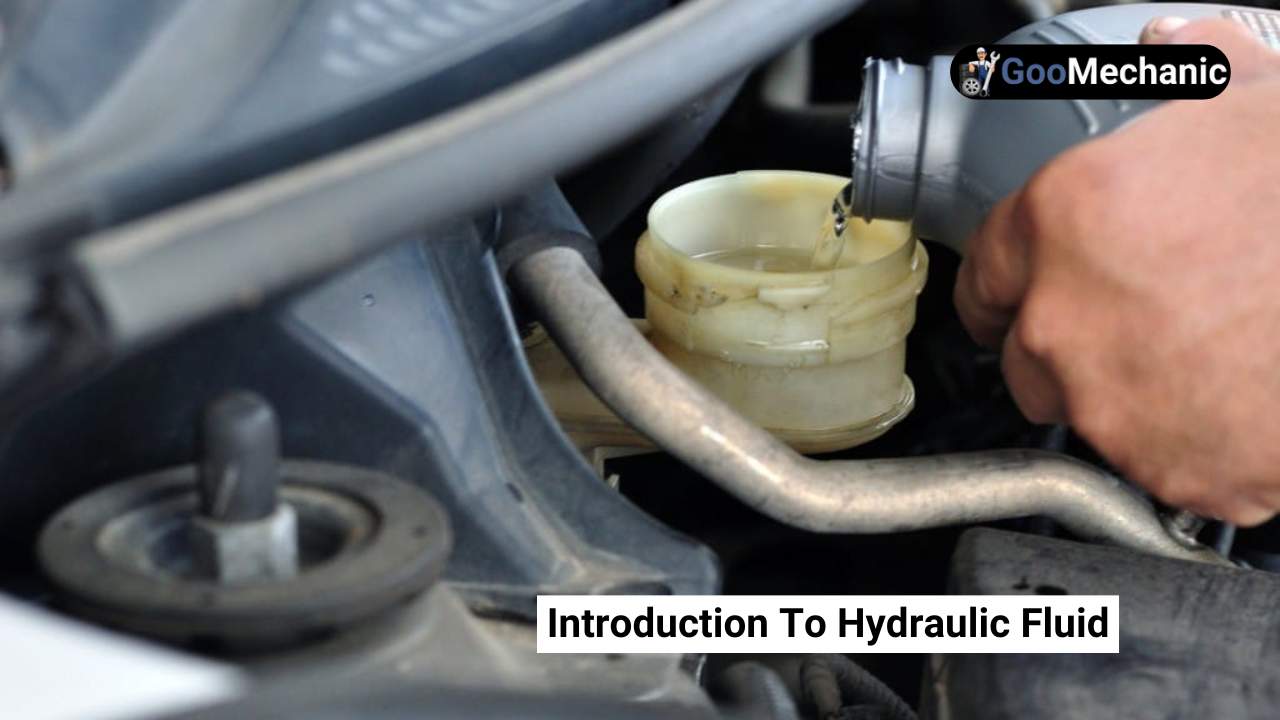Hydraulic fluid in a car is considered incompressible. This characteristic ensures efficient power transmission in hydraulic systems.
Hydraulic fluid plays a crucial role in a car’s hydraulic systems, such as brakes and power steering. Its incompressible nature allows it to transfer force effectively, ensuring smooth and reliable operation. This fluid helps in converting mechanical energy into hydraulic energy, making systems more responsive.
Regular maintenance and checks on hydraulic fluid levels are essential for optimal performance. Contaminated or low hydraulic fluid can lead to system failure and reduced efficiency. Understanding the properties and importance of hydraulic fluid can help in maintaining a car’s hydraulic systems, ensuring safety and functionality on the road.
Introduction To Hydraulic Fluid

Hydraulic fluid plays a crucial role in a car’s hydraulic systems. It powers various components, ensuring smooth operation and control. Understanding hydraulic fluid’s properties and types is essential for car maintenance and performance.
Definition And Purpose
Hydraulic fluid is a specially formulated liquid used in hydraulic systems. It serves multiple purposes, including power transmission, lubrication, and heat dissipation. In a car, hydraulic fluid is key for the operation of brakes, steering, and suspension systems.
Its primary function is to transmit force through the hydraulic system. By doing so, it helps convert mechanical energy into hydraulic energy. This conversion ensures efficient operation of various components.
Common Types
There are several types of hydraulic fluids available, each suited for specific applications. Here are some common types:
- Mineral Oil-Based Fluids: These are derived from refined crude oil. They are widely used due to their affordability and availability.
- Synthetic Fluids: These are chemically engineered for superior performance. They offer better temperature stability and longer service life.
- Water-Based Fluids: These are less common but used in fire-resistant applications. They provide excellent safety in high-risk environments.
- Biodegradable Fluids: These are environmentally friendly alternatives. They are ideal for applications where spills may occur.
| Type | Characteristics |
|---|---|
| Mineral Oil-Based Fluids | Affordable, widely available |
| Synthetic Fluids | High performance, temperature stable |
| Water-Based Fluids | Fire-resistant, safe |
| Biodegradable Fluids | Eco-friendly, safe for spills |
Choosing the right hydraulic fluid is essential for optimal car performance. Always refer to the car’s manual for the recommended fluid type.
Properties Of Hydraulic Fluids

Understanding the properties of hydraulic fluids is essential for car maintenance. These fluids play a crucial role in the performance of hydraulic systems. Let’s explore their key properties such as viscosity, thermal stability, and compressibility.
Viscosity
Viscosity measures how thick or thin a fluid is. It affects the flow and pressure of hydraulic systems. A fluid with low viscosity flows easily, while high viscosity fluid flows slowly.
Choosing the right viscosity ensures optimal performance. Check your car manual for the recommended viscosity grade. Incorrect viscosity can cause wear and tear.
Thermal Stability
Thermal stability is crucial for hydraulic fluids. It determines how well the fluid maintains its properties under heat. High thermal stability means the fluid performs well at high temperatures.
Thermal stability prevents the fluid from breaking down. This ensures consistent performance and extends the lifespan of hydraulic components.
Compressibility
Compressibility refers to how much a fluid can be compressed. Hydraulic fluids are generally considered incompressible. This property is vital for efficient hydraulic system performance.
If a fluid is compressible, it can lead to system inefficiencies. This can cause delays in response and reduced force transmission.
| Property | Description |
|---|---|
| Viscosity | Measure of fluid thickness |
| Thermal Stability | Resistance to heat degradation |
| Compressibility | Incompressible for efficient performance |
Maintaining proper hydraulic fluid properties ensures your car’s hydraulic system works efficiently. Always use the recommended fluid type for best results.
Mechanics Of Hydraulic Systems
Understanding the mechanics of hydraulic systems is crucial for car maintenance. These systems use hydraulic fluid to transfer energy and perform various functions. The fluid’s properties play a key role in system efficiency.
How Hydraulic Systems Work
Hydraulic systems rely on Pascal’s Law. This law states that pressure applied to a confined fluid is transmitted equally in all directions. This principle allows a small force to generate a much larger force.
In cars, hydraulic systems operate brakes and power steering. These systems use pumps, cylinders, and fluid to create movement. The hydraulic fluid transmits the force from the pedal or steering wheel to the brakes or wheels.
Here is a simplified table of the main components:
| Component | Function |
|---|---|
| Pump | Generates fluid flow |
| Cylinder | Converts fluid pressure into motion |
| Valves | Control fluid direction and pressure |
Role Of Hydraulic Fluid
The hydraulic fluid is the lifeblood of the system. It transmits force, lubricates moving parts, and removes heat. Hydraulic fluid must be incompressible for the system to work efficiently.
Hydraulic fluid also contains additives to prevent corrosion and wear. The fluid must be clean and free of contaminants. Dirty fluid can damage the system.
Key properties of hydraulic fluid include:
- Viscosity
- Lubricity
- Thermal stability
Regular fluid checks ensure system efficiency and longevity. Always use the recommended fluid for your car.
Compressibility In Fluids
Compressibility in fluids is an essential concept. It determines how much a fluid can be compressed. This is crucial in systems like car hydraulics.
Basic Principles
Hydraulic fluid in a car is usually considered incompressible. This means it cannot be significantly compressed. This property ensures efficient power transfer in the hydraulic system.
When pressure is applied, the fluid transmits the force without losing much volume. This makes hydraulic systems reliable and effective.
Factors Affecting Compressibility
Several factors can affect the compressibility of hydraulic fluid. These include temperature, fluid type, and pressure.
- Temperature: Higher temperatures can increase fluid compressibility.
- Fluid Type: Different fluids have different compressibility levels.
- Pressure: Extremely high pressure can make fluids more compressible.
Understanding these factors helps maintain efficient hydraulic systems. Proper maintenance can prevent issues related to fluid compressibility.
Hydraulic Fluid Compressibility

Hydraulic fluid plays a vital role in your car’s hydraulic systems. The compressibility of hydraulic fluid affects system performance. Understanding this concept can help you maintain your car better.
Impact On System Performance
Hydraulic fluid compressibility impacts how well the system works. High compressibility can cause delays in response times. Low compressibility ensures precise movements and control. This is crucial for brakes and steering systems.
Compressible fluids can lead to air entrapment. This can cause spongy brakes or delayed steering responses. It also affects the efficiency of hydraulic pumps and cylinders. Maintaining the right fluid type is key.
Measurement Techniques
Several methods can measure hydraulic fluid compressibility. One common technique is the bulk modulus test. This test measures the fluid’s resistance to compression. Another method uses acoustic velocity to determine compressibility.
| Measurement Technique | Description |
|---|---|
| Bulk Modulus Test | Measures resistance to compression |
| Acoustic Velocity | Determines compressibility using sound waves |
Both methods have their pros and cons. Bulk modulus tests are precise but require specialized equipment. Acoustic velocity is quicker but less accurate.
Choosing the right method depends on your needs. Regular testing ensures your hydraulic system remains efficient and safe.
Real-world Applications
Hydraulic fluid is essential for many systems. Its role in compressibility is crucial. Here, we explore its applications in cars and machinery.
Automotive Systems
Hydraulic fluid operates in many car systems. It powers brakes, steering, and suspension. Its incompressibility is key for smooth operation.
- Brake Systems: Hydraulic fluid transfers force from the pedal to the brakes. This ensures quick and safe stops.
- Power Steering: Fluid assists in steering the car with ease. It makes turning the wheel effortless.
- Suspension: Hydraulic fluid absorbs shocks. This provides a comfortable ride.
In each system, fluid incompressibility ensures efficient power transfer. This guarantees reliable performance.
Industrial Machinery
Hydraulic fluid is vital in industrial machinery. It powers various equipment and tools. Its incompressibility is essential for precision and control.
| Application | Description |
|---|---|
| Excavators | Hydraulic fluid powers the arm and bucket. This allows precise digging. |
| Press Machines | Fluid enables high-pressure operations. This ensures accurate pressing of materials. |
| Conveyor Systems | Hydraulic fluid drives the belts. This ensures smooth movement of goods. |
In these applications, hydraulic fluid’s incompressibility is vital. It ensures machinery operates efficiently and accurately.
Challenges And Solutions
Understanding the compressibility of hydraulic fluid in cars presents unique challenges. Hydraulic systems rely on the fluid’s behavior under pressure. In this section, we will explore common challenges and innovative solutions.
Dealing With Compressibility
Hydraulic fluid is not entirely compressible. This slight compressibility can affect performance. Pressure changes can create delays in response. This issue is critical in car braking systems. Inconsistent pressure can lead to spongy brakes. These brakes feel soft and less responsive.
Temperature changes also impact fluid compressibility. High temperatures can increase fluid volume. This leads to reduced efficiency. Cold temperatures can cause the fluid to thicken. This makes the system less responsive. Addressing these challenges is crucial for car safety.
Innovative Solutions
Manufacturers use high-quality hydraulic fluids to minimize compressibility. These fluids maintain stability under pressure. They also ensure consistent performance in varying temperatures.
Another solution is the use of accumulators. Accumulators absorb excess pressure. They help maintain steady pressure in the hydraulic system. This reduces the effects of fluid compressibility.
Regular maintenance also plays a key role. Checking and replacing hydraulic fluid keeps the system efficient. It prevents issues caused by fluid degradation.
In summary, using high-quality fluids, employing accumulators, and regular maintenance are essential. These steps help address the challenges of hydraulic fluid compressibility in cars.
Future Trends In Hydraulic Fluids
The future of hydraulic fluids in cars holds many exciting changes. Innovations are happening fast. These changes could improve performance and sustainability.
Advancements In Fluid Technology
New fluid technologies are emerging. Nanotechnology is one of the most promising areas. It helps create fluids that are more efficient and durable.
Another advancement is synthetic hydraulic fluids. These fluids perform better under extreme conditions. They also last longer, reducing the need for frequent changes.
Smart fluids are another exciting development. They can adjust their properties based on conditions. This adaptability leads to better performance and efficiency.
Sustainability Concerns
Environmental impact is a big concern. New hydraulic fluids focus on being more eco-friendly. They are designed to have fewer harmful effects on the planet.
Biodegradable hydraulic fluids are becoming more popular. They break down naturally without harming the environment. This makes them a better choice for sustainability.
The industry is also working on recycling. Used hydraulic fluids can be cleaned and reused. This reduces waste and the need for new fluids.
Frequently Asked Questions
Is Hydraulic Fluid Compressible?
Hydraulic fluid is nearly incompressible. This characteristic makes it ideal for efficient power transmission in hydraulic systems.
What Is The Compression Rate Of Hydraulic Oil?
Hydraulic oil has a very low compression rate, approximately 0. 5% per 1,000 psi. This makes it highly efficient.
Why Does Hydraulic Fluid Need To Be Incompressible?
Hydraulic fluid needs to be incompressible to efficiently transmit power and ensure precise operation of hydraulic systems.
Is A Hydraulic System Incompressible?
A hydraulic system is considered incompressible. Hydraulic fluids have very low compressibility, ensuring efficient energy transfer.
Conclusion
Hydraulic fluid in a car is not compressible. This property ensures efficient power transfer in hydraulic systems. Understanding this helps in maintaining your car’s performance. Regular checks and proper fluid levels are crucial. This knowledge aids in better vehicle maintenance, ensuring safety and longevity.
Keep your hydraulic system in top condition.
